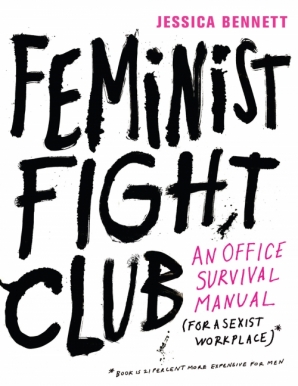|
|
|
See another section in Articles & Speeches |
|
|
Feminist Fight Club – An Office Survival Manual for a Sexist Workplace Reinventing the American Dream
by Jessica Bennett
 This is an excerpt from Feminist Fight Club – An Office Survival Manual for a Sexist Workplace Reinventing the American Dream by Jessica Bennett.
Introduction: Prepare for Battle
“The law cannot do it for us. We must do it for ourselves. Women in this country must become revolutionaries.”
- Shirley Chisholm, the first African American woman elected to the U.S. Congress
It was a fight club — except without the fighting and without the men. Every month or so, a dozen of us — women in our twenties and thirties, struggling writers and creative types, most of us with second jobs — would gather at a friend’s apartment (actually, her parents’ apartment: none of us had an apartment big enough to fit that many people). She’d provide the pasta, salad, or pasta salad, and we’d bring the wine (and seltzer...for some reason we all really liked seltzer). We’d pile our plates high and sink into the cushioned couches in her living room to talk — or, bitch, rather — about our jobs.
In those early days, the rules of the fight club were simple:
What was said in the group stayed in the group.
Members were never to speak the group’s name.
And we practiced strict vag-cronyism.
That is, membership was not based on merit but vagina. Which meant that once you were in, you were in: engulfed in bosom-like support, embraced and respected, encouraged with finger snaps and fist bumps and cat videos, but no cattiness. We had a strict no “mean girls” policy. The fact that the club was kept a secret basically justified its need.
We were smart, ambitious women striving to “make it” in New York, a city that eats the soft alive. We had grown up in an era of Girl Power — Spice Girls, you know it — when it wasn’t simply an encouragement but an expectation that girls could be and do whatever they wanted. And we believed it. The gender war, we thought, was a relic of our mother’s generation — a battle won long ago.
And yet each of us, in every field, in every role, was stumbling into gender land mines at seemingly every turn — and often ones we didn’t even know existed. It was like trying to dodge that stench that lurks on a New York City street on a hot summer night: there you were, minding your own business, and BAM.
Our meetings had a moderator, of sorts — our host. Sometimes she’d hand out note cards containing handwritten questions. (Where do you want to be in five years? What’s one way you plan to help another woman this year? Who’s your favorite female perfor — Oh wait, duh, Beyoncé.) There were times we’d gather in smaller, informal settings as needed: if one of us had a crisis, an upcoming job interview, an article due, an impending mental breakdown, or looming unemployment — which nearly every one of us had faced at one point or another.
But usually we simply hung out, ate snacks, shot the shit, and talked about work.
I’ve vowed to keep their details secret, but the group looked something like this: Danielle, a brilliantly funny writer, had been toiling away as an assistant at a well-known TV show (a show that, at that time, had not a single female writer). On the side, she’d written two books, created web videos, and taught herself Photoshop — mostly so she could make colorful invitations to Fight Club meetings. But at work, she was consistently passed over for promotions. Tired, disgruntled, and dying of boredom, she had taken to mining the web for inspirational lady-news to send to get us through the day. That, and making feminist cat sweatshirts. Did any of us know somewhere she could try to sell them?
Nola, a project manager at an ad agency, had recently emailed us all in a rage. She was leading a top-level client meeting when one of her male colleagues had asked if she wouldn’t mind grabbing some coffee for the group. Stunned, she found herself trudging to the kitchen to complete the task. She returned to the meeting with a coffee stain down the front of her blouse and daggers shooting from her eyes.
There was another woman, a straight-shooting web developer named Rachel, whose male boss told her she was “too aggressive” with her staff. Everyone knew what that was code for: too loud, a little bossy, not “ladylike” enough, according to some made-up standard. But this woman was good at her job — that was never in question. So why should the volume of her voice have mattered?
There was a documentary filmmaker, Tanya, who told a story of having her idea for a show handed off to a male colleague to produce. She was livid. But she stayed quiet, not wanting to be viewed as too “emotional” (or a poor team player). If any of us got wind of any production openings, please, please send them her way.
I was working at Tumblr at the time, my job part of a widely touted initiative to hire journalists to create content on a blogging platform most commonly known for GIFs (and porn). The perks of a tech company were shiny, for a second: Free meals. Endless snacks. Bring your dog to work day...every day. Fancy cold-brew coffee, and the hot “brewmaster” named Grady who would deliver it. Unlimited vacation. A kegerator that would ID you (and your beer preferences) by your fingerprint. A ping-pong table for when you got back from your vacation, finished your personalized beer, played with your dog and just wanted to...you know, relax, man.
And then there were the annoyingly bro-y things: said ping-pong table was six feet from my desk. (No, really — ping-pong balls ricocheting off my laptop were a daily occurrence.) Off-site field trips consisted of basketball games and Medieval Times, and in-office social hour meant a brotastic round of all-staff flip cup — again, on the pingpong table, feet from my desk.
For more information: Feminist Fight Club – An Office Survival Manual for a Sexist Workplace by Jessica Bennett. Published by Harpers Collins.
 Jessica Bennett is an award-winning journalist and critic. She writes for the New York Times, where she covers gender issues, culture, and has a monthly column on millennials and language. A former staff writer at Newsweek, Jessica is also a contributing editor for LeanIn.org, the nonprofit founded by Sheryl Sandberg, where she is the cofounder and curator of the Lean In Collection, an initiative to change how women are portrayed in stock photography. Yes, she's in a real-life feminist fight club. Jessica Bennett is an award-winning journalist and critic. She writes for the New York Times, where she covers gender issues, culture, and has a monthly column on millennials and language. A former staff writer at Newsweek, Jessica is also a contributing editor for LeanIn.org, the nonprofit founded by Sheryl Sandberg, where she is the cofounder and curator of the Lean In Collection, an initiative to change how women are portrayed in stock photography. Yes, she's in a real-life feminist fight club.
|